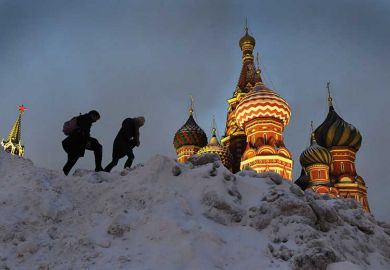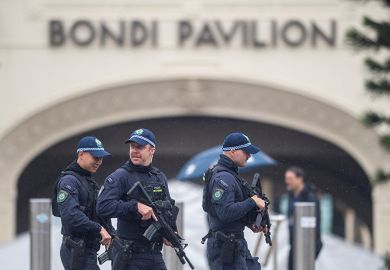As pressing political and social issues in contemporary Russia become harder and harder to discuss through online and artistic media, it may seem that academia is the only sphere left in which critical debate enjoys a relatively safe haven.
However, while freedom of thought and research are legally protected under articles 29 and 44 of Russia’s 1993 constitution, academic freedom is increasingly under threat. The Russian government has not made open and concerted attempts to suppress it, but direct political control over universities’ teaching provision has been increased, as has indirect influence of academic debate and research directions.
Several recent developments illustrate this. In early 2019, in a bid to protect industrial secrets, the government restricted Russian scientists’ contacts with foreigners by requiring them to notify the ministry about such meetings, ensure that at least two Russians are present and report on the conversations that take place.
Then, towards the end of last year, amendments to existing laws broadened the infamous “foreign agent” category, which can now be extended to individuals. Not-for-profit organisations have been deemed foreign agents since 2012 if they receive funding from abroad and engage in vaguely defined “political activity”, which renders them liable to additional audits and requires them to specify in all their official statements that they are being made by a “foreign agent”.
Following the December 2019 amendments, any Russian citizen can be recognised as a foreign agent if they have a foreign source of income and cooperate with “foreign agent” media, including social media platforms.
On the surface, these moves do not infringe academic freedom. The Ministry of Higher Education and Science emphasised that its recommendations on contacts with foreign researchers are not obligatory. The Kremlin distanced itself, too, with Dmitri Peskov, Vladimir Putin’s press secretary, describing the measures as too far-reaching. Nor does the broadened definition of “foreign agent” directly target academics.
In practice, however, these moves harm academic freedom in several ways. First, overzealous bureaucrats can be expected to apply and abuse the “recommendations” on contact with foreign agents. One Russian university has already taken them very seriously. Kazan Federal University reportedly used them to construct its own regulations requiring scholars to elaborate “a unified position of the Russian side” on whatever issues are considered during meetings with foreign scholars (which should take place only in specially designated offices). The university’s governing body brazenly presented these measures as being aimed at increasing the institution’s effectiveness – whatever that may mean – rather than as a limitation.
Moreover, the policy moves open the way for state officials and university bureaucrats to selectively punish scholars who fall out with either local authorities or their superiors. And, most importantly, they deepen the climate of uncertainty in Russian academia. While some scholars may laugh them away, considering them absurd and impossible to implement, others will feel greater unease about developing foreign contacts.
The discretion of state bureaucrats to interpret what counts as “posting information online and receiving money from abroad” is limitless. Commenting on the broadened definition of a “foreign agent”, Russian lawyers point to the lack of precision in new regulations and the possibility of applying them to almost anyone. Such imprecise legal regulation may dissuade scholars from participating in research projects with foreign funding.
These developments are not isolated. They follow the deprivation, in 2017, of the teaching licences and accreditation of the European University at St Petersburg and the Moscow School of Social and Economic Sciences, which obliged the institutions to withhold teaching activities for extended periods of time. Within the Russian higher education system, which enrolled more than a million students in 2018, these two small, private universities are minuscule, but they are internationally recognised and their travails have not gone unnoticed in the rest of the sector. Their targeting by the authorities has been attributed to their international links and, in the European University’s case, its teaching of gender studies.
In its Free to Think report of 2018, Scholars at Risk, an international network of academic institutions committed to defending academic freedom and human rights, concluded that the universities’ targeting by the Russian state represents “serious threats to academic freedom and institutional autonomy”, emphasising that when institutions face closure, the resulting harm extends to the entire higher education sector and to wider society.
The government has ambitious plans for Russian academia. It sees it as an important element of international status-building. It is also keen to attract foreign students in the face of demographic decline at home. These ambitions underlie efforts to improve the position of Russian universities in international rankings, with programmes such as the 5-100 excellence initiative and the £7.8 million national “Science” project. Internationalisation is among the stated aims of both programmes.
However, recent developments push in the opposite direction. They aim at curbing Russian scholars’ contacts with colleagues abroad by creating the impression that links with the outside world are somewhat suspicious and unwelcome. Foreign grants and scholarships may come to be regarded by Russian researchers as toxic for the simple reason that they entail receiving money from abroad, leaving the academics prone to being labelled foreign agents.
Meanwhile, decreasing budgetary resources and visa-related challenges have already made it more difficult for Russian scholars to attend international events and develop contacts abroad. Increasing isolation and stunted progress seem the inevitable consequence.
Katarzyna Kaczmarska is lecturer in politics and international relations at the University of Edinburgh.
POSTSCRIPT:
Print headline: Slow death of academic freedom
Register to continue
Why register?
- Registration is free and only takes a moment
- Once registered, you can read 3 articles a month
- Sign up for our newsletter
Subscribe
Or subscribe for unlimited access to:
- Unlimited access to news, views, insights & reviews
- Digital editions
- Digital access to THE’s university and college rankings analysis
Already registered or a current subscriber?







